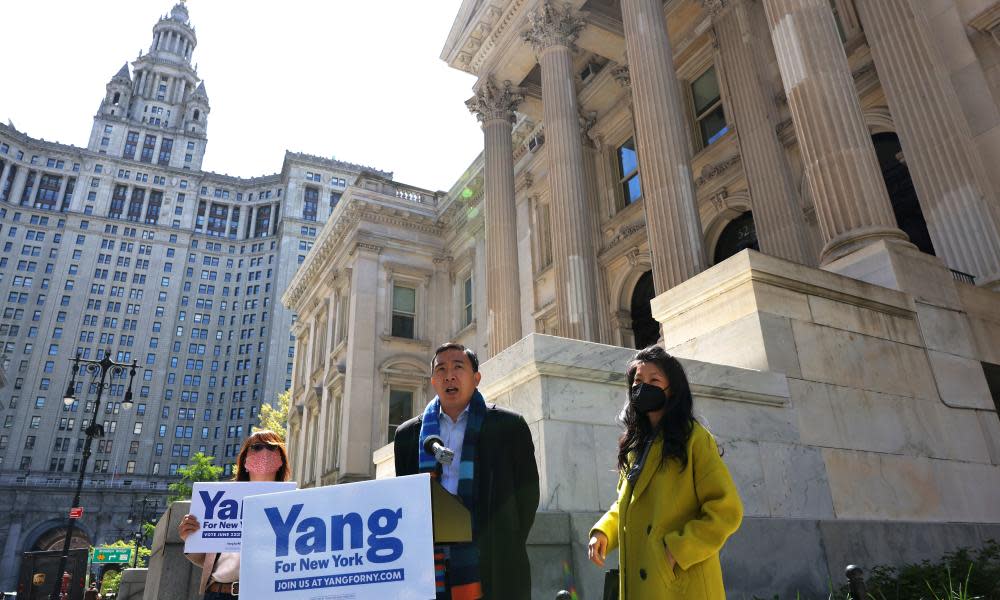Frontrunner Andrew Yang gets a grilling during New York mayoral debate

- Oops!Something went wrong.Please try again later.
The New York City mayoral vote has been dubbed the city’s “most consequential election in decades”, and on Thursday the race began to heat up, with a Democratic debate that featured sporadic potshots at Andrew Yang, the longshot presidential candidate and the frontrunner to be the city’s next mayor.
Related: I’m stuck in post-pandemic limbo – but don’t make me Zoom again | Emma Brockes
Yang, a tech entrepreneur, has led the polls for months, making him a target for his lesser-known rivals: he has found himself variously accused of lacking governmental experience, stealing credit from Black women for the voter turnout in Georgia, and being uninterested, until now, in New York politics.
The winner of the Democratic primary, held on 22 June, is expected to go on to win the mayoral election, giving an extra edge to Thursday’s debate, the first of three held before the vote.
As well as handling the recovery from the pandemic, New York’s next mayor will have to tackle homelessness, racial inequality, and a heightened demand for police reform – an issue that drew some of the most personal responses.
“I’ve been Black my entire life,” said Maya Wiley, a civil rights activist and former adviser to Mayor Bill de Blasio, when asked for her thoughts on handling New York’s sprawling police department.
“I know what it is like to fear crime, and I know what it’s like to fear police violence.”
Ray McGuire, a former investment bankerand centrist candidate, said he was opposed to radical police reform but hinted at the prejudice many Americans face at the hands of law enforcement.
“It’s very personal to me. I’m a 6ft 4in, 200lb Black man. I want to have the police protect me and not profile me,” McGuire said.
Many of the candidates attended Black Lives Matter protests last summer, but on Thursday some found themselves walking a tightrope between criticizing police and committing to tackling crime, including Yang, who specifically staked out his opposition to defunding the police.
Eric Adams, a former NYPD police captain, former New York state senator, and the current Brooklyn borough president, gave arguably the most robust defence of the police, claiming that a “prerequisite to prosperity is public safety”. He said the city must deal with police misconduct but focused his answer on the need to tackle the flow of guns into NYC.
The virtual format of the debate – the eight candidates appeared from the comfort of their homes or in at least one case their campaign office – seemed to lead to a relatively civil discourse, but there were some flashpoints, including when Adams, somewhat spuriously, accused Yang of claiming credit for the work of Black women activists like Stacey Abrams.
The moment came as Yang attempted to deflect from his record of not voting in local elections by asserting that he helped the Democrats win Senate seats in Georgia in January.
Adams, who was second to Yang in the most recent poll, accused the entrepreneur of being “disrespectful” to Black women who helped get out the vote in the state. Yang responded that he gave full credit to other activists, but said he had helped fundraise, adding: “It’s OK for other people to contribute to their success.”
Three women were among the eight candidates. There is enthusiasm among many for New York City to choose a mayor who is not a white man.
Since 1834, when the mayor of New York City began being elected by popular vote, it has elected 109 leaders all of them male, and only one of them, David Dinkins, a person of color.
The fact that one of America’s allegedly most progressive cities has never had a female leader was not directly addressed on Thursday, although Wiley hinted at the issue of sexism during the debate.
“It’s really interesting to hear men always say they have all the experience,” Wiley said, as two of her male rivals squabbled over who bore more responsibility for the great recession.
The issue of economic recovery gave Dianne Morales, arguably the most progressive candidate in the race, to point out the existing problems the pandemic, which killed more than 32,000 people in New York City, has exposed.
Covid-19 has “has not had an equal impact on everyone”, Morales said.
“We have generated more millionaires and billionaires over the course of this last year while we made our more vulnerable essential workers much more marginalized, and pushed them further to the edge.”
As the debate drew to a close the candidates will have hoped they did enough to at least increase their name recognition – something Yang, as a prominent presidential candidate, has benefited so far – and with campaign TV ads set to saturate New York City screens in the coming weeks, there is time yet to rein in the frontrunner.
